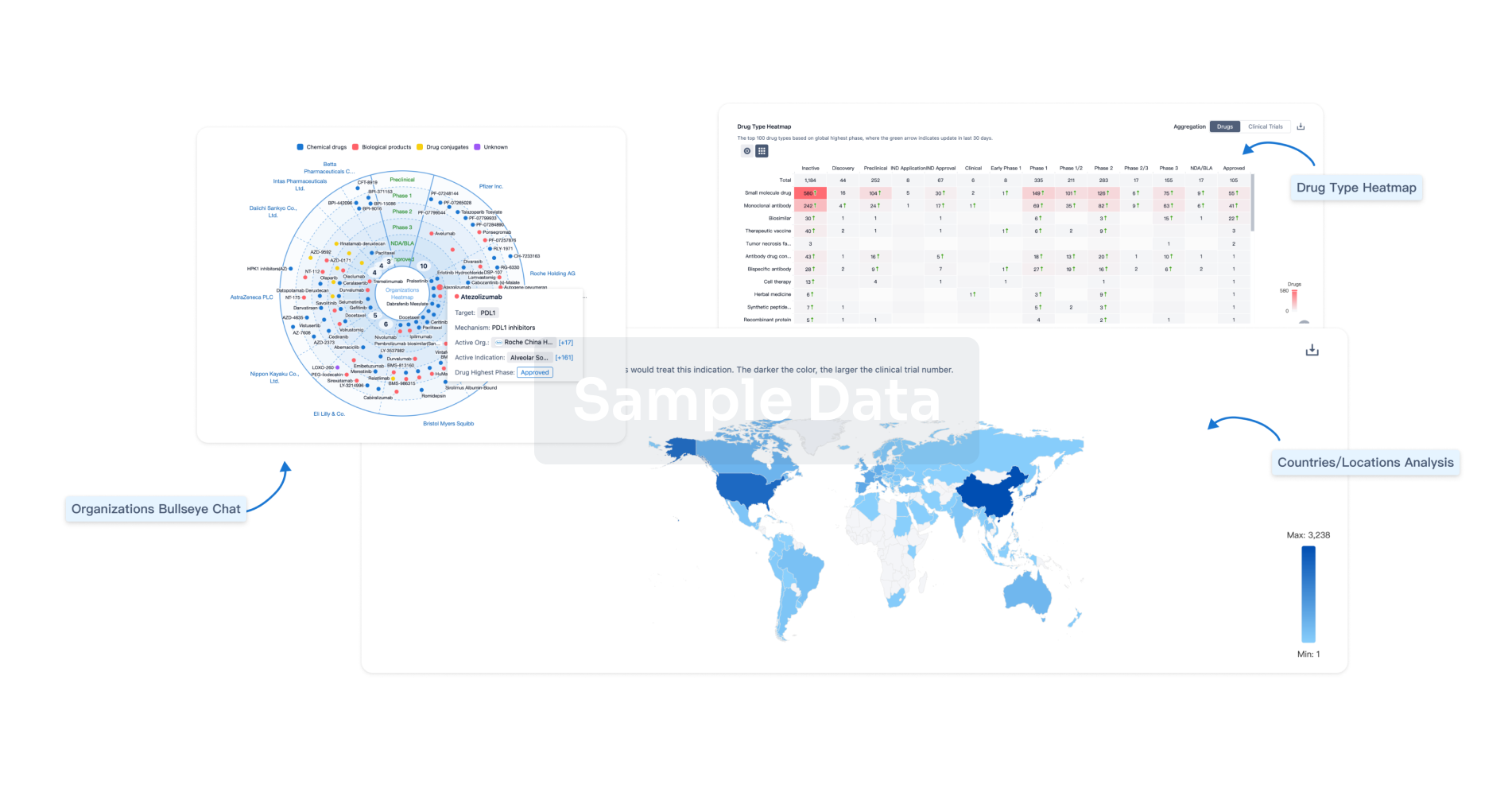Request Demo
Last update 08 May 2025
Maturity-Onset Diabetes of the Young, Type 4
Last update 08 May 2025
Basic Info
Synonyms MATURITY-ONSET DIABETES OF THE YOUNG, TYPE 4, MATURITY-ONSET DIABETES OF THE YOUNG, TYPE IV (disorder), MODY, TYPE 4 + [9] |
Introduction Monogenic diabetes caused by inactivating mutation(s) in the PDX1 gene, encoding pancreas/duodenum homeobox protein 1. Homozygous PDX1 mutations result in permanent neonatal diabetes. |
Related
1
Drugs associated with Maturity-Onset Diabetes of the Young, Type 4Target |
Mechanism glucokinase activators |
Active Org. |
Originator Org. |
Active Indication |
Inactive Indication |
Drug Highest PhaseApproved |
First Approval Ctry. / Loc. China |
First Approval Date30 Sep 2022 |
1
Clinical Trials associated with Maturity-Onset Diabetes of the Young, Type 4NCT04531631
Effects of Dorzagliatin on 1st Phase Insulin and Beta-cell Glucose Sensitivity in Individuals With Recent-onset Type 2 Diabetes and Monogenic Diabetes
Diabetes is a disorder of energy energy metabolism. Glucose is the main energy substrate for generation of ATP to maintain cellular metabolism, structure and function. Glucokinase (GK) serves as a glucose sensor for the initiation of the energy generation.for energy metabolism. Dorzagliatin is a novel, first-in-class, dual-acting allosteric GK activator (GKA). It increases the affinity of GK for glucose by directly binding a pocket distal to its active site, thus lowering the set point for glucose-stimulated insulin secretion in the beta-cell.
Dorzagliatin is a new drug which acts as GK sensor activator (GKA). It can restore the sensitivity of the pancreas cells to glucose and improve glucose control. The drug has been trialled in healthy volunteers and in individuals with type 2 diabetes.
The aim of this study is to understand the way in which dorzagliatin works to improve blood sugar control in people with diabetes. The study will look at how dorzagliatin affects insulin secretion and the sensitivity of the pancreas to changes in blood sugar levels. We will examine whether dorzagliatin can restore the function of this GK sensor in patients with known mutations. In a cross-over study, we will evaluate the effects of dorzagliatin, a specific GKA versus placebo in terms of insulin secretion and beta-cell glucose sensitivity in patients with newly-diagnosed T2D and patients who are known heterozygous carriers of GK mutations.
Dorzagliatin is a new drug which acts as GK sensor activator (GKA). It can restore the sensitivity of the pancreas cells to glucose and improve glucose control. The drug has been trialled in healthy volunteers and in individuals with type 2 diabetes.
The aim of this study is to understand the way in which dorzagliatin works to improve blood sugar control in people with diabetes. The study will look at how dorzagliatin affects insulin secretion and the sensitivity of the pancreas to changes in blood sugar levels. We will examine whether dorzagliatin can restore the function of this GK sensor in patients with known mutations. In a cross-over study, we will evaluate the effects of dorzagliatin, a specific GKA versus placebo in terms of insulin secretion and beta-cell glucose sensitivity in patients with newly-diagnosed T2D and patients who are known heterozygous carriers of GK mutations.
Start Date30 Sep 2020 |
Sponsor / Collaborator |
100 Clinical Results associated with Maturity-Onset Diabetes of the Young, Type 4
Login to view more data
100 Translational Medicine associated with Maturity-Onset Diabetes of the Young, Type 4
Login to view more data
0 Patents (Medical) associated with Maturity-Onset Diabetes of the Young, Type 4
Login to view more data
39
Literatures (Medical) associated with Maturity-Onset Diabetes of the Young, Type 401 May 2024·Peritoneal Dialysis International: Journal of the International Society for Peritoneal Dialysis
Standards of diabetes care and burden of hypoglycaemia in people with diabetes on peritoneal dialysis: Results from a real-world clinical audit
Article
Author: Dick, Jonathan ; Williams, Jennifer ; Phare, Natalie ; Eid, Hatem ; Moutzouris, Dimitrios ; Karalliedde, Janaka ; Onyema, Michael ; Wijewickrama, Piyumi ; Lambie, Mark ; Vas, Prashant
01 Jan 2024·Zoological Research
Pancreatic agenesis and altered m6A methylation in the pancreas of PDX1-mutant cynomolgus macaques
Article
Author: Yang, Shi-Hua ; Guo, Yonglong ; Chen, Baoyi ; Zhang, An-Ran ; Guo, Yunyi ; Huang, Junjiu ; Zhang, Wen-Hui ; Lee, Yaqin ; Huang, Jun-Jiu ; Xu, Jie-Qiu ; Zhang, Anran ; Zhu, Yanhua ; zhang, wenhui ; Chen, Xue-Ying ; Yang, Shihua ; Zhuang, Jiong-Han ; Guo, Yun-Yi ; Li, Ya-Qing ; Meng, Wei ; Zhu, Yan-Hua ; Chen, Xueyin ; Chen, Bao-Yi ; Xu, Jieqiu ; zhuang, jionghan ; Guo, Yong-Long
01 Jan 2024·Diabetes & Metabolism
Dominant PDX1 deficiency causes highly penetrant diabetes at different ages, associated with obesity and exocrine pancreatic deficiency: Lessons for precision medicine
Article
Author: Vaillant, Emmanuel ; Froguel, Philippe ; Vaxillaire, Martine ; Bonnefond, Amélie ; Kouidrat, Youssef ; Amanzougarene, Souhila ; Dechaume, Aurélie ; Toussaint, Bénédicte ; Azahaf, Mustapha ; Le Collen, Lauriane ; Delemer, Brigitte ; Derhourhi, Mehdi
Analysis
Perform a panoramic analysis of this field.
login
or

AI Agents Built for Biopharma Breakthroughs
Accelerate discovery. Empower decisions. Transform outcomes.
Get started for free today!
Accelerate Strategic R&D decision making with Synapse, PatSnap’s AI-powered Connected Innovation Intelligence Platform Built for Life Sciences Professionals.
Start your data trial now!
Synapse data is also accessible to external entities via APIs or data packages. Empower better decisions with the latest in pharmaceutical intelligence.
Bio
Bio Sequences Search & Analysis
Sign up for free
Chemical
Chemical Structures Search & Analysis
Sign up for free

